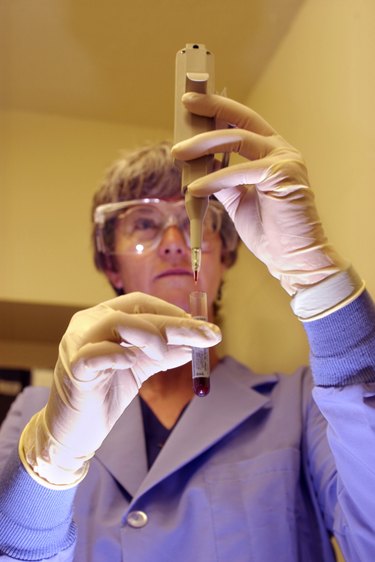
Elevated GGT can signify many serious health issues. The liver enzyme is a telltale sign of many liver diseases and cancer, alcoholism, pancreas- and kidney-related issues. It may even foretell your risk of cardiovascular death. It's especially known to be elevated when your bile duct is blocked; cholesterol is one of the components of bile. Normal ranges of GGT vary by the test and the measure used to read your results, so you should also talk to your doctor about interpreting your specific results.
About GGT
Video of the Day
GGT stands for gamma-glutamyl transpeptidase. It's an enzyme found primarily in your liver. One of its main functions is to help create an antioxidant known as glutathione, which helps keep free radicals at bay. GGT levels often rise when bile doesn't flow properly out of your liver, sometimes because of an obstruction in the bile duct. Cholesterol, one of the chief components of bile, is critical to digestion and elimination.
Video of the Day
GGT Levels
Your doctor or laboratory can test your level of GGT through a blood test. According to MedlinePlus, a normal levels of GGT range from 0 to 51 international units per liter, or IU/L. However, the way readings are measured can vary. For example, in a report by Louisiana State University's School of Allied Health, GGT is measured in units per liter, or simply U/L. By that standard, the school reported that normal GGT levels for women younger than age 45 range from 5 to 27 U/L, and for women older than 45 and all men, the normal range is from 6 to 37 U/L. For that reason, you need to talk with your healthcare provider about how your GGT reading is interpreted and get a sense for what levels constitute "elevated."
Cholesterol Connection
Your liver is the hub where GGT levels and cholesterol connect. A dynamic organ, your liver both produces cholesterol and sends enzymatic signals to alert the body that there's trouble with the organ. Researchers from the University of California, Los Angeles demonstrated in March 2011 that a single mechanism controls both the production of cholesterol and the development of scar tissue in response to liver disease or injury. Liver disease often first manifests through elevations in key enzymes, including GGT.
Possible Reasons for Elevated GGT
Elevated GGT levels can indicate numerous serious health conditions, especially cholestastic, or blocked, liver disease, hepatitis, liver scarring or a tumor. GGT is particularly sensitive to alcohol, and it is elevated in alcoholism and the use of medications and drugs, which have to be processed by your liver. LSU researchers said the sharpest elevations in GGT levels could indicate obstructive jaundice and liver metastasis, which involves cancerous tumors that have moved from the liver to someplace else in the body. Other increases in GGT might be attributed to acute pancreatitis, kidney disease, recent surgery and metastasis of prostate cancer. A September 2005 report by ScienceDaily said elevated GGT may also be an early warning signal of heart disease. The report summarized research concluding that the higher the amount of GGT in the blood, the greater the risk of dying from a cardiovascular event. In that research, elevated was defined as 36 U/L and "moderately high" was 18 U/L for women and 56 U/L for men.
- MedlinePlus: Gamma-Glutamyl Transpeptidase
- British Liver Trust: Liver Function Tests
- ScienceDaily; Elevated GGT Enzyme May Predict Risk of Death from Cardiovascular Disease; September 2005
- Louisiana State University School of Allied Health: Outpatient Management Manual: Laboratory Tests
- University of California Los Angeles; Cholesterol Regulator Key in Liver Scarring, Cirrhosis; March 2011
- American Liver Foundation: Liver Health and Wellness
- Colorado State University Digestion Index: Secretion of Bile and the Role of Bile Acids In Digestion
- Florida State University Molecular Expressions: Glutathione
- MedlinePlus: Liver Metastases
Is this an emergency? If you are experiencing serious medical symptoms, please see the National Library of Medicine’s list of signs you need emergency medical attention or call 911.